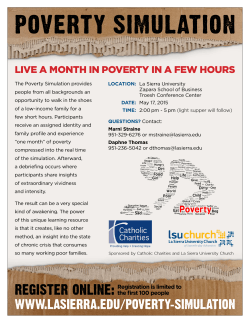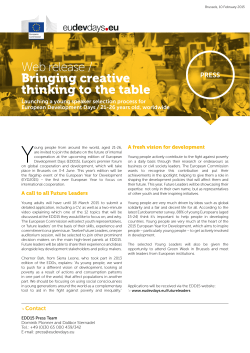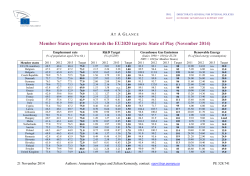
Statements - Oregon Business Council
OBC POVERTY TASK FORCE Statements of Support Issued April 13, 2015 For Poverty Reduction Legislation Under Consideration in the Oregon Legislature OBC POVERTY TASK FORCE STATEMENT ON THE EARNED INCOME TAX CREDIT The Oregon Business Council’s Poverty Task Force has been charged with identifying actions that would support the business community’s goal of reducing the poverty rate to below 10 percent by 2020. Poverty reduction of that magnitude requires a range of initiatives that stretch across education, work force development, job creation, and safety net reform. A critical and expanding component of the U.S. safety net is the federal Earned Income Tax Credit (EITC) and Oregon’s supplement to it. In 2013, the EITC provided $600 million in credits to 279,000 low and middle-wage workers. It is widely recognized as a tool that encourages work, boosts health, and even improves school outcomes. University of California’s Hilary Hoynes considers the EITC “one of the most successful labor market innovations in U.S. history.” Oregon’s supplemental EITC equals 8% of the federal EITC and is refundable. The legislature should incorporate recommendations of leading poverty experts—Harvard University’s Richard Murnane and University of California-Irvine’s Greg Duncan— and increase the credit for families with children under age 6 (for example, a 16% Oregon credit for families with children ages 0-2 and 12% for families with children ages 3-5). Research shows poverty rates and childcare costs are higher for families with pre-school aged children. The task force will also work with Oregon’s Congressional delegation on EITC reform at the federal level. OBC POVERTY TASK FORCE STATEMENT ON TANF REDESIGN The Oregon Business Council’s Poverty Task Force has been charged with identifying actions that would support the business community’s goal of reducing the poverty rate to below 10 percent by 2020. Poverty reduction of that magnitude requires a range of initiatives that stretch across education, work force development, job creation, and safety net reform. The redesign of the Temporary Assistance to Needy Families (TANF) program is high on the taskforce priority list. TANF provides parents the tools to be job ready and supports stable learning environments for children. Oregon’s TANF program was more responsive to the recent economic downturn than almost all other states’ programs. Cash assistance caseloads rose—appropriately—during recent periods of high unemployment. Now, as the economy recovers, forecasts suggest those caseloads will decline. Associated fiscal savings provide an opportunity to correct some of the program’s design flaws. The task force strongly supports a $30 million reinvestment in TANF as a down payment on making the program work and making work pay. Opportunities for redesign include: • • • Increasing the outdated TANF income limit to smooth the transition to work Developing work programs and requirements that serve the diversity of labor market conditions across the state Evaluating the adequacy of the maximum TANF-SNAP OBC POVERTY TASK FORCE STATEMENT ON THE CONSOLIDATION AND EXPANSION OF CHILD CARE TAX CREDITS The Oregon Business Council’s Poverty Task Force has been charged with identifying actions that would support the business community’s goal of reducing the poverty rate to below 10 percent by 2020. Poverty reduction of that magnitude requires a range of initiatives that stretch across education, work force development, job creation, and safety net reform. The nature of U.S. safety net shifted fundamentally with the passage of federal welfare reform in 1996. The creation of the Temporary Assistance to Needy Families (TANF) program signaled an expectation that able-bodied parents of young children are expected to work. For many parents, a transition from welfare-to-work is economically practical only with access to, and assistance with, quality childcare. To improve affordability, Oregon operates two highly related tax credits designed to offset the costs of childcare for low- and middle-income families: the federal Child and Dependent Care Credit and the Oregon Working Families Childcare Credit. The OBC Poverty Task Force strongly supports legislative efforts to consolidate the two credits into a single credit that piggybacks off of the federal Child and Dependent Care credit. If built off the existing federal credit, the federal government bears the auditing cost. If Oregon didn’t have to audit its state-only program, the state could save up to $1 million biennially—resources that could be redirected to the credit itself. Moreover, on-going operation of two credits with similar names and purposes is confusing to taxpayers. Funding for the resulting credit should be increased to expand coverage and ensure no family is made worse off by the consolidation.
© Copyright 2025










